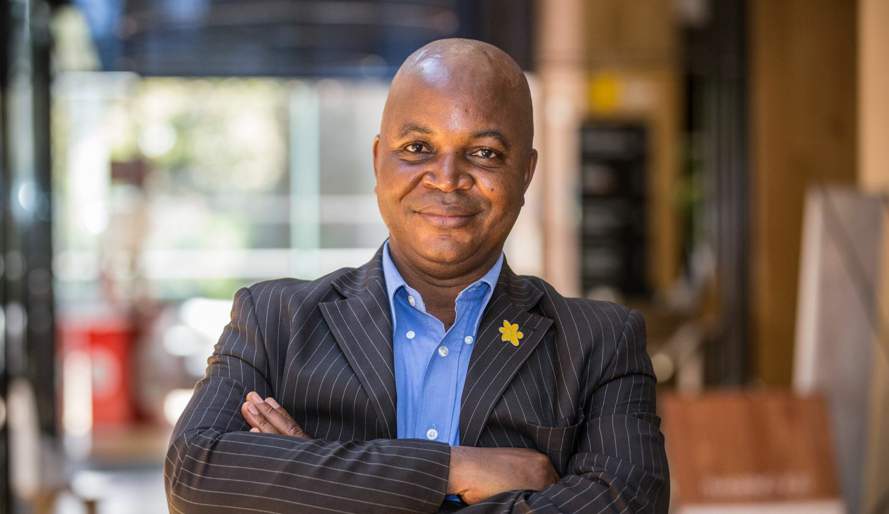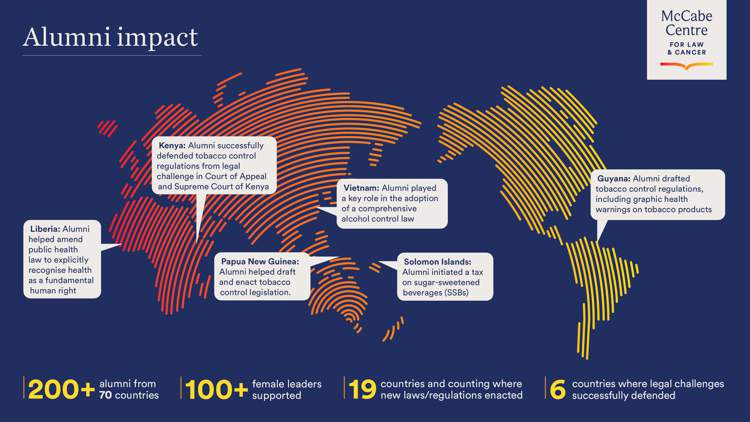
James Jallah’s career at the Liberian Ministry of Health started in December 2016 with a three-month contract and a seemingly simple project: review the country’s Public Health Law.
Nearly five years later, James is a legal counsel for the ministry and is leading a much-expanded overhaul of Liberia’s Public Health Law to bring non-communicable diseases (NCDs) and human rights to the forefront.
“I took the job without knowing the enormity of the task ahead,” James says from his office in Liberia’s capital Monrovia. “Now I am so proud of how far we’ve come.”
Putting the public health pieces together
There were signs early on that three months wasn’t going to be enough. Liberia’s current Public Health Law dates back to 1976, and while there have been several amendments since, James says the legislation remains fragmented and limited in scope.
“We need to bring all the pieces together,” he says.
There were also broader challenges facing the review, including a lack of public health resources and a lack of awareness in Liberia about health law. James admits he was not a health law expert when he started at the ministry, despite graduating top of his class in law school. Like most lawyers in Liberia, he studied law without a specific focus on health.
“Health law expertise is rare around here,” he says. “I think that’s one reason we struggled to implement and enforce parts of the Public Health Law.”
Building capacity in public health law
As he settled into the role, James started making connections and learning more about public health. The more his knowledge grew, the more the scope of the project grew.
At an April 2017 tobacco control workshop run by World Health Organization (WHO) Regional Office for Africa (AFRO) James learned about the WHO Framework Convention on Tobacco Control (WHO FCTC). He realised it was going to take a lot of work to bring the two-page tobacco control section in Liberia’s existing Public Health Law in line with the treaty.
In September that same year, James attended the McCabe Centre’s intensive legal training course in Melbourne. Though he came to learn about tobacco control, he ended up learning the ins and outs of all sorts of public health policies, and meeting lawyers and policymakers working on a variety of legal measures.
“I got to learn about successes and challenges from people in different parts of the world,” he says. “That’s when I really started to feel comfortable.”
I took the job without knowing the enormity of the task ahead. Now I am so proud of how far we’ve come.
Acting on NCDs and working collaboratively
The McCabe Centre’s focus on NCDs really resonated with James. He saw the huge impact that cancer, diabetes and heart disease were having in Liberia, and realised he could not revise the Public Health Law without making mention of NCDs. After returning to Liberia, he drafted a new provision in the Public Health Law to put action against NCDs “on a pedestal.” Though it’s just one paragraph, the new provision sets the government’s intention to develop programs, policies and regulations to tackle the NCD epidemic.
The new provision on NCDs also emphasises the importance of working across sectors, which was another lesson from James’ time at the McCabe Centre and the WHO AFRO meeting. After learning about the importance of multisectoral action on NCDs in course sessions, he saw the results of multisectoral collaborations while walking Melbourne’s streets.
“There were paths for people to cycle and pedestrian lanes,” James recalls. “Our streets in Liberia are not laid out like that, and that’s because our different ministries were not communicating as they should.”
James has since made collaboration a priority, working closely on public awareness campaigns with the ministry’s NCD unit and teaming up with the Liberian customs authority to help enforce taxes on tobacco imports. He even collaborates internationally throughout Africa, gaining knowledge and sharing what he has learned.
“Public health is not a Ministry of Health responsibility alone, and we can’t do it alone as one country,” he says.
 McCabe Centre alumni make an impact globally, including James Jallah's work in Liberia.
McCabe Centre alumni make an impact globally, including James Jallah's work in Liberia.
The right to health in Liberia
For James, a key part of the revised Public Health Law is the recognition that health is about more than just diseases and medicine – it is a human right. He and his colleagues added an amendment that explicitly states that health is a human right, and applied a human rights lens to new chapters on mental health, emergency treatment, reproductive health and more.
“Access to health is a human rights issue, and people should not be discriminated against in the delivery of health services,” he says.
These major revisions have meant the initial project to review the law has grown substantially, and there is still plenty of work to get the revisions finalised and passed. But James – now five years into a three-month project – says he feels at home at the Ministry of Health and is making his family of traditional healers proud.
“I am hoping we will be able to save lives with this law,” he says. “Because for me, every life is important.”
***
Find out more about the McCabe Centre's work on NCDs and human rights by subscribing to our newsletter.